Welcome to Part Eight of The Beginner’s Guide to Freediving. This chapter covers the effects of pressure and depth on freedivers with Boyle’s law, Henry’s law, and what happens when you get hit with nitrogen narcosis.
Effects of Pressure and Depth
In this article, we will start looking at the physics of freediving: pressure and depth, the principles behind what happens to our bodies as we descend, and how this affects our freediving.
Basic Physics of Freediving – Dealing With Pressure
When you freedive, even to a depth of just a couple of meters, your body is subject to the effects of pressure. The effects of pressure and depth on freedivers is far greater than the ones we usually experience in our day-to-day lives, and without an understanding of how they affect the body and how to deal with them, serious injury can occur.
At sea level, the pressure of the air that surrounds us equal to 1 bar, which is sometimes referred to as 1 atmosphere. Dive to just 10 meters deep and that pressure is doubled – because water is much denser than air, it exerts a much greater compressive force on your body.
For every additional 10 meters deeper you dive, the pressure on your body increases by 1 bar. As you can see from the table below, our bodies are subject to 3 bars or atmospheres of pressure at a depth of 20 meters and 4 bar/atm at 30m.
| Depth | Bar/atmospheres (ATM) of pressure | Volume of air in our bodies |
| 0 meters (surface) | 1 | 1 |
| 10 meters | 2 | 1/2 |
| 20 meters | 3 | 1/3 |
| 30 meters | 4 | 1/4 |
So Why Do We Need To Know This?
Effects of Pressure and Depth on Freedivers – Boyle’s Law and Freediving
You can see from the table above that increasing pressure causes a reduction the volume of the air spaces in our body. This is known as Boyle’s Law, which states that “if the temperature remains constant, the volume of a gas is inversely proportional to the absolute pressure.” Simply put, the deeper you go, the smaller the volume of air in your body.
This becomes immediately apparent as you descend, usually by a feeling of pressure in the ears, just like when you’re in an airplane coming in to land. When freediving wearing a mask, there are four air spaces that must be equalized – the ears, mask, sinuses and lungs. Provided you are flexible enough or do not dive very deep, your lungs simply reduce in volume as you descend. So you usually only need to equalize the pressure in your ears, sinuses and mask.
By the time you have descended to 10 meters, the volume of air in your mask and ears has reduced by 50%, so it is vital to frequently equalize these spaces or risk perforating or rupturing your eardrums, or rupturing the capillaries in your eyeballs. How to equalize will be covered in a subsequent article.
This decrease in volume of our air spaces also has an affect on our buoyancy. Archimedes’ principle states that
“the upward buoyant force that is exerted on a body immersed in a fluid, whether fully or partially submerged, is equal to the weight of the fluid that the body displaces.”
What this means in practice is that as the volume of the air inside our body and mask reduces, we become less buoyant.
This is important in relation to weighting and safety. Weighting for freediving will be covered in a separate article, however what you need to know is that you should be positively buoyant on the surface and to a depth of at least 10 meters. This is because during the last phase of your dive, when your reserves are at their lowest, you do not want to be struggling to return to the surface.
In addition, the greatest risk from the effects of pressure and depth on freedivers of shallow water blackout occurs in the last 10 meters as the volume of air in your lungs increases by 100%, drawing oxygen out of the blood stream. If you were to black out, you need to be positively buoyant to make it easier for your buddy to rescue you.
Effects of Pressure and Depth on Freedivers – Henry’s Law and Freediving
As we’ve seen, as you descend on a dive, the increased pressure causes the volume of air in your lungs to decrease. But as this happens, the partial pressure of the air inside your lungs increases. This means that there is a greater concentration of oxygen and other gases in our lungs than there is in the blood. It is explained in another law – Henry’s Law:
“At a constant temperature, the amount of a given gas that dissolves in a given type and volume of liquid is directly proportional to the partial pressure of that gas in equilibrium with that liquid.”
Diffusion is the movement of gas molecules from a region of higher concentration to a region of lower concentration until they are equal. The effects of pressure and depth on Freedivers means that the deeper you go, the more oxygen will dissolve into your blood. Then, as you ascend, the volume of air inside your lungs increases, oxygen comes out of the blood, back into your lungs.
As the greatest pressure changes take place between the surface and a depth of 10m, this is where proportionally more oxygen comes out of the blood. Consequently, this is why you are at the greatest risk of blackout, especially when you are already running low on oxygen at the end of your dive.
Effects of Pressure and Depth on Freedivers – Nitrogen Narcosis and Freediving
It is not only oxygen that becomes more concentrated in the blood as you dive. As you descend, the partial pressure of nitrogen in your lungs also increases. Nitrogen is the cause of decompression sickness, or DCS, which will be covered in another article, but it also causes what is known as nitrogen narcosis. This is sometimes referred to as as the ‘rapture of the deep’ or ‘being narced’. The effects can occur as depths as shallow as 30m and impairs your mental functions and causes mood swings.
Experiencing nitrogen narcosis is often likened to being drunk, which can be a pleasant or an unpleasant experience. Freedivers have been known to be distracted at depth by a pretty fish or a vision of a mermaid, or disturbed by negative thoughts. Both can be fatal as they prevent the freediver from making safe and rational decisions.
Narcosis is one of the effects of pressure and depth on freedivers that slows the thought processes and can completely alter their view of a situation, to the extent that they dive deeper under the impression that they are heading for the surface. It also negatively affects physical coordination and temperature control, making the freediver feel warmer than they actually are, increasing the risk of hypothermia.
Narcosis affects every diver differently and at different depths. Freedivers have reported that the effects of narcosis come on sooner, or are more pronounced, in cold or dark water and if they are in a negative state of mind prior to the dive. The most important thing (as with anything to do with freediving) is to always dive fit, well, and in a positive frame of mind, with safety systems in place and to only increase depth gradually.
Effects of Pressure and Depth on Freedivers – Why Are Effects Different Between Scuba Diving and Freediving?
Nitrogen narcosis will affect freedivers in the same way as Scuba divers, as the partial pressure of nitrogen in the lungs will be the same if a Scuba or Freediver went to the same depth. However, Boyle’s Law and Henry’s Law do not affect Scuba divers in the same way as they have a continuous supply of air.
As the air spaces decrease as a Scuba diver descends, they have a constant and ready supply of air to equalize with and so are not limited by the air in their lungs. The volume of air also remains constant in their lungs, so they have to use a Buoyancy Control Device (BCD) and breathing techniques in order to control their buoyancy, whereas a freediver will pass their point of neutral buoyancy and then sink.
Scuba divers must exhale continuously on the way up from a dive, though. If they did not, the air they breathed at depth would expand in their lungs as they ascended, causing lung expansion injuries and a risk of death.
Henry’s Law does not affect Scuba divers in the same way as freedivers, either, because they have a constant supply of oxygen for their needs. However, due to a greater amount of nitrogen being absorbed by their body due to breathing compressed air at depth, Scuba divers run a greater risk of experiencing decompression sickness.
Finally…
Increased depth in water equals increased pressure, reduced volume of the air spaces in your body, decreased buoyancy and increased amounts of oxygen and nitrogen in your blood. This means that freedivers need to:
- Equalize the pressure in their air spaces
- Adjust their weighting so they are positively buoyant for the last stages of their dive
- Increase depth gradually and safely to combat the effects of low oxygen levels at the end of the dive and increased risk of narcosis
We’ll be looking freediving safety and minimizing risks in later articles.
Written by Emma Farrell
The Beginner’s Guide to Freediving is written by Emma Farrell. She is one of the world’s leading freediving instructors and has been teaching freediving since 2003. She is the author of the book ‘One Breath, a Reflection on Freediving’, has written courses that are taught worldwide, taught gold medal winning Olympic and Paralympic athletes, and has appeared numerous times on television teaching everyone from Hugh Fearnley-Whittingstall to Ellie Simmonds how to freedive.
Learn to freedive with the author of The Beginner’s Guide to Freediving
Go Freediving is the longest established, most experienced and friendliest freediving course provider in the UK, led by world class freediving instructor trainer Emma Farrell, and her team of personally trained instructors. No other course provider has such a good instructor to student ratio, safety record and personal touch.
Whether you’re a beginner dipping your toes into the world of freediving, a seasoned pro looking to turn professional, or simply a freediver of any level who wants the best freediving holiday in the world, we’re here for you!
Learn more about Freediving
Read the previous chapter of The Beginner’s Guide to Freediving – ‘Breathing for Freediving’ here now
Read the next chapter of The Beginner’s Guide to Freediving – ‘The Mammalian Dive Reflex and how it helps Freedivers’ here now
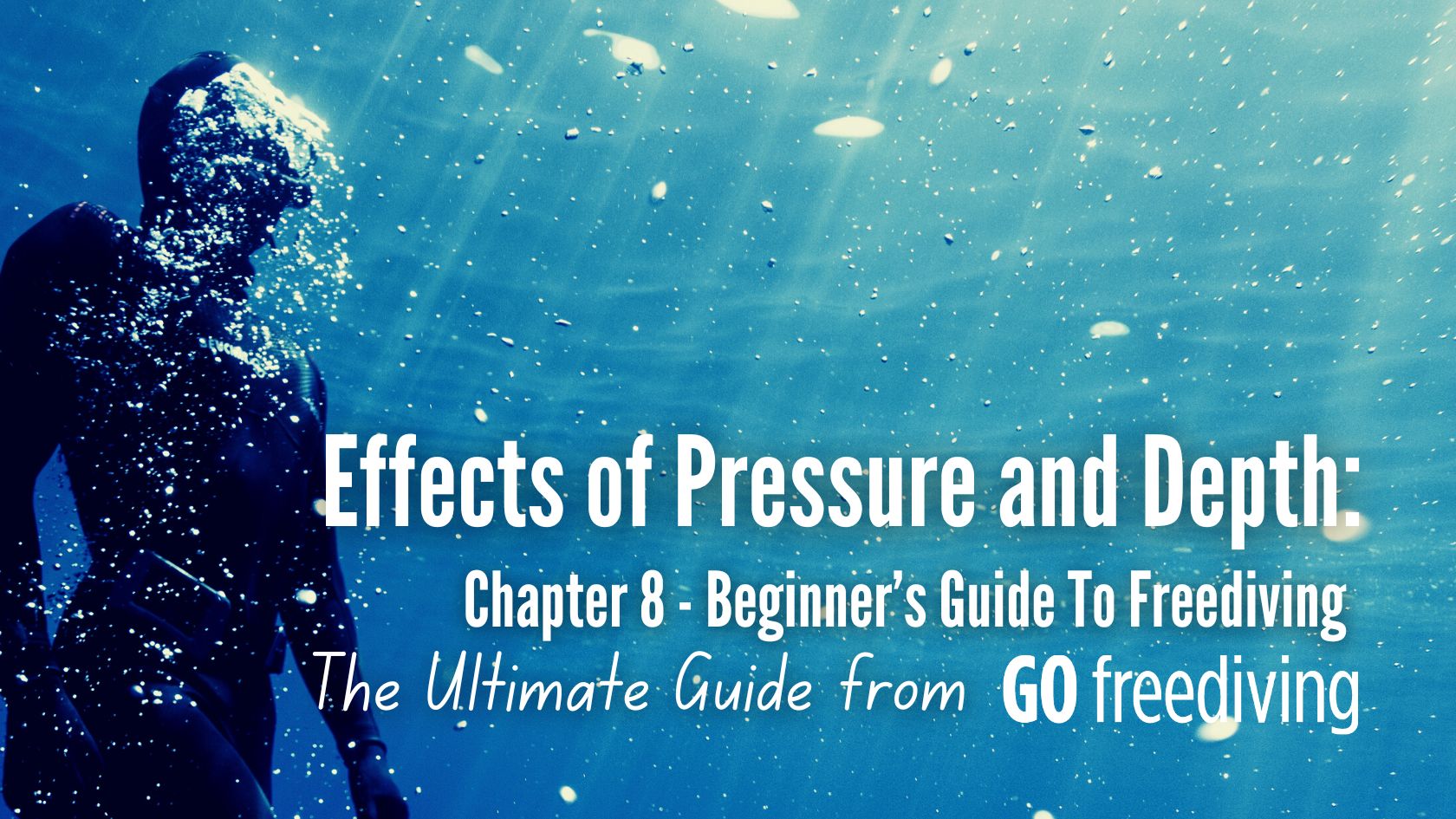
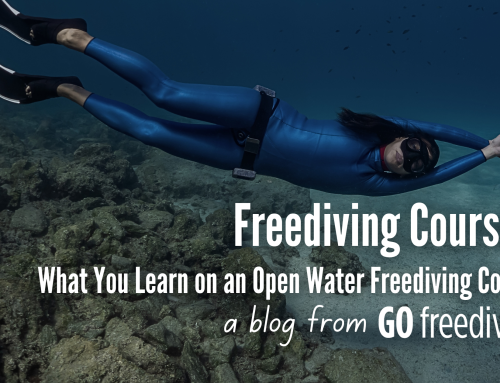

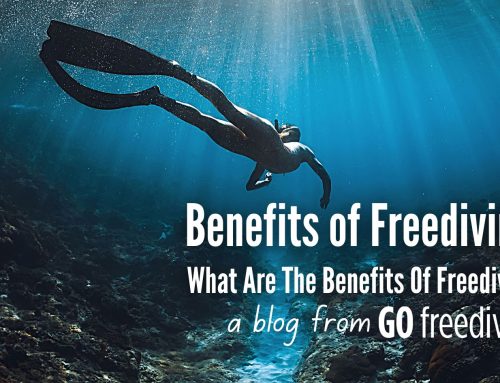
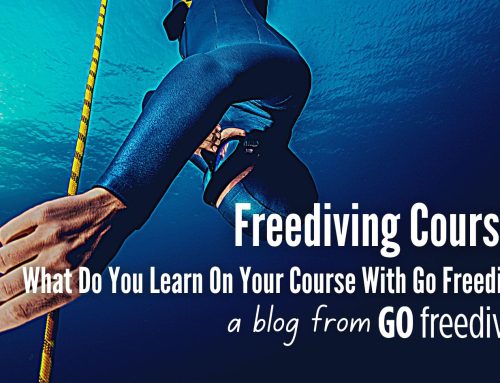
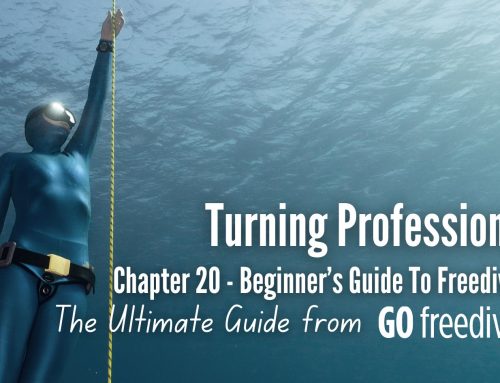
Leave A Comment